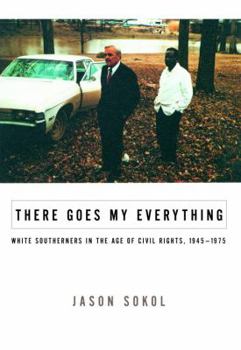There Goes My Everything: White Southerners in the Age of Civil Rights, 1945-1975
Select Format
Select Condition 
Book Overview
While the landmarks of the civil rights movement have become indelible parts of our collective memory, few have written about what life was like for white southerners who lived through that historic... This description may be from another edition of this product.
Format:Hardcover
Language:English
ISBN:0307263568
ISBN13:9780307263568
Release Date:August 2006
Publisher:Alfred A. Knopf
Length:433 Pages
Weight:1.65 lbs.
Dimensions:1.5" x 6.6" x 9.4"
Customer Reviews
5 ratings
Extraordinary
Published by Thriftbooks.com User , 16 years ago
One of the best written, most thought provoking books I have ever read. It covers a vast amount of material in an extraordinarily well organized manner. And the writing style can only be described as riveting. Recommednded without reservation.
Interesting perspective
Published by Thriftbooks.com User , 16 years ago
I enjoyed this book. It came from a different perspective as most civil rights books. I still do not feel sorry for white people that the world finally caught on that African Americans are human, but I better understand their mindset at the time. Just for the record, I am white, but I like to think of all humanity as people, not colors, races, ethnicities, etc....
Absolutely Incredible - a must read!
Published by Thriftbooks.com User , 16 years ago
Jason Sokol, in his first book, has given us a picture that most academic historians of the Civil Rights have not evaluated - the response of the people that had been the oppressors for hundreds of years in the Southern United States. So many traditional histories of the Civil Rights Struggle focus on dynamic personalities like Martin Luther King, Rosa Parks, or Malcolm X. Many others look strictly at the legal aspects of key Supreme Court decisions such as Brown vs. the Board of Education. Yet others study the growth of "Black Power". Sokol has taken all of these and evaluated them from a different perspective - how the oppressors became equal to the oppressed. It is a lively and original study based largely on primary materials including oral interviews of participants, legal documents, and contemporary newspapers. I found such tidbits as the white-on-white violence and the comparison of those whites acquiescing to or supporting full integration to Communists to be fascinating stories in and of themselves. When combined with the legal fights waged by people such as Ollie McClung and the inadvertent radicals such as the Garielle family in New Orleans, Sokol provides us with a history of the Civil Rights Era that is necessary and long overdue. There should be many studies devoted to the topics that Sokol has introduced in this work, and it should foster the flourishment of the historiography of the Civil Rights Era for years to come.
A Scholarly Effort on An Important Subject
Published by Thriftbooks.com User , 17 years ago
Jason Sokol has hit a home run in his first effort in writing a book. Although it is slightly more than 350 pages I finished it in two days. Covering the years from 1945 through 1975, from the end of World War II, the death of Emmett Till in 1955, the tumultous 1960's, and into the 1970's author Sokol covers the events that turned the world of southern whites upside down. The author doesn't merely stick to the most publicized events that tore at our country's prejudices, but also the less publicized incidents in other cities of America. President Lyndon Johnson gets deserved credit for the passage of the 1964 Civil Rights Bill and the 1965 Voting Rights Act. Ronald Reagan chose to begin his 1980 presidential campaign in Philadelphia, Mississippi, speaking on the importance of states' rights realizing that this was where three civil rights workers were murdered in 1964. George W. Bush's sweep of the South in each of his elections reinforces that President Johnson was correct in stating he just lost the South with the passage of the Civil Rights Bill and Voting Rights Act. Ironically whites were actually oppressed by clinging to racial myths regarding blacks in American society that had been drummed into them from one generation to another and accepted them as truths. In freeing them from their prejudices they actually became liberated themselves. Having lived through the period of time covered in the book I can see that America has come a long way, but let's not be naive in thinking we still don't have a long way to go.
Insightful, Exciting, Intelligent
Published by Thriftbooks.com User , 17 years ago
Jason Sokol makes a compassionate, nuanced, brave examination of so many subtle and not-so-subtle changes that took place within white southern hearts, minds and communities. An eye-opener and a page-turner for me. A valuable addition to the field of history. An important book for all Americans to read.




